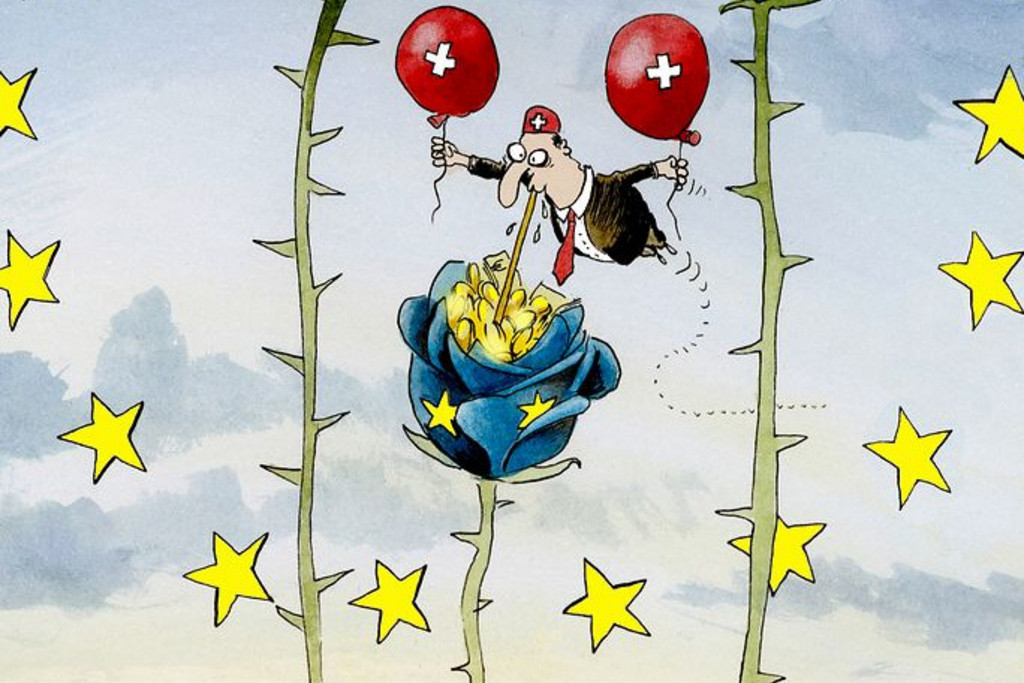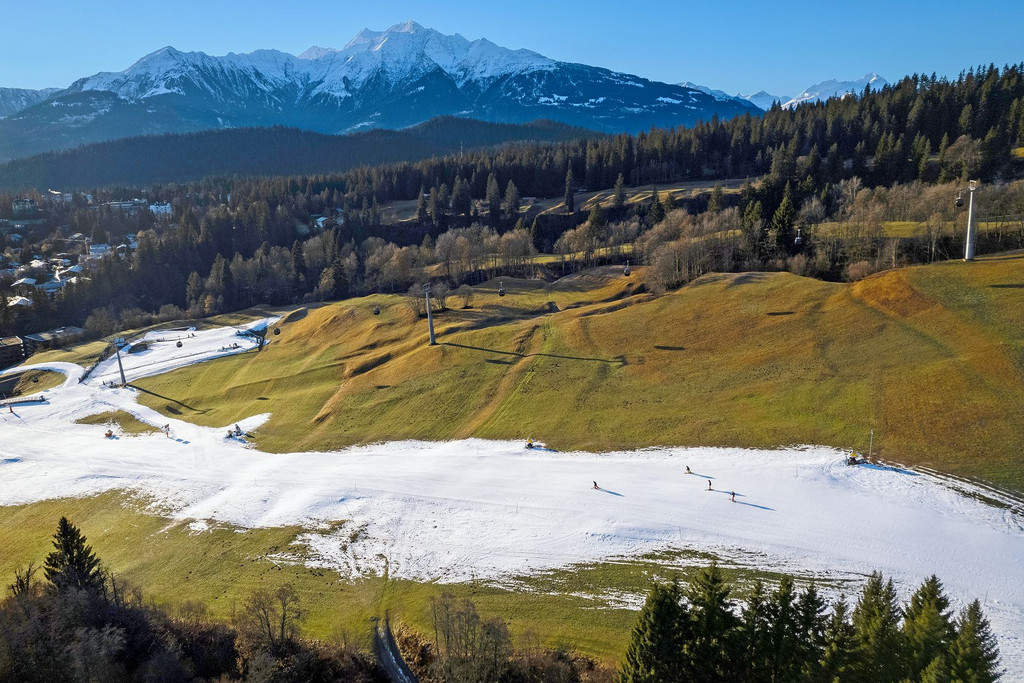Stability and balance are such strong influences in Swiss political life that national elections rarely produce tectonic shifts. Yet political experts have had to resort to employing superlatives in the aftermath of the 2019 elections, as they unanimously cite a change of “historic proportions”.
What happened? Essentially, the electorate opted for environmental parties in greater numbers than ever before. The Swiss Green Party (the Greens) gained 17 seats in the National Council and now has 28 National Councillors. No party has made such a leap forward since 1919, with the Greens now one of the four strongest parties in terms of voting share (Percentage share of the votes: see diagram).
This result is notable for how consistent it is across the country, regardless of the linguistic divide. The Greens even made strong gains in Ticino. They also outdid the opinion polls by a considerable margin. National Councillor and Green fraction leader Balthasar Glättli (canton of Zurich) reacted to the spectacular result almost in disbelief: “I never expected this in my wildest dreams.” The gains of the centrist Green Liberal Party (the Green Liberals), who ended up with more than twice as many seats as previously, made for a green win-win. With a combined total of 44 seats in the National Council, the Greens and the Green Liberals now wield considerable clout on environmental issues. The ongoing climate debate was certainly a driving factor behind the power shift. Forget elections to the National Council and the Council of States – “climate elections” was instead the term on everyone’s lips.
Parliament is now greener than the results would suggest
Indeed, the success of the two green parties at the ballot box is only part of the story, because the “green wave” had already begun rolling in before the elections. The writing was on the wall from the outset. Take the Liberals (FDP), whose stance on a number of important environmental issues suddenly turned greener towards the end of the election campaign. For example, they announced in autumn that they were in favour of introducing an environmental tax on plane tickets, whereas previously they had tried to scupper this green levy. The party lost four National Council seats, yet the outcome might have been worse without this about-turn. A poor showing from the Swiss People’s Party (SVP), which railed consistently against “climate hysteria”, shows what could have happened. The SVP lost as many as twelve seats but remains Switzerland’s strongest political party. These losses are not only due to the SVP’s attempt to ride out the climate debate, but are also down to the party’s key messages on migration and the EU falling on much less receptive ears than four years ago.
Parliament has shifted only slightly to the left
All four parties in government – SVP, FDP, CVP and SP – were punished at the ballot box. The SP, which sees itself as green by nature, was hit hard, evidently losing votes to parties that are green by name. Although the Greens more than offset the SP’s losses with their emphatically left-wing social policies, the upsurge of the Green Liberals means that the new parliament will primarily be much greener but not considerably more left-leaning.
This could have a liberating effect on political discourse in Berne, as the bloc mentality of left and right wing loses significance. The combined green parties will constitute a third pole on environmental issues, while the centrist CVP, still a strong force despite election losses, will focus increasingly on striking compromises with the various power bases.
Many more women in parliament
Besides climate issues, the national women’s strike in June also had an impact on the election results. The proportion of women in the National Council has risen from 32 to 42 per cent – a sizeable contingent even by international standards. Never has the number of elected females increased as much since the introduction of women’s suffrage in 1971 – a result not even the initiators of the Helvetia is calling! women’s movement dared hope was possible.
Parliament is slightly more youthful
Not only has Berne become decidedly greener, notably more feminine and a little bit more left-wing, but the average age in parliament has also fallen. Many of the newly elected MPs are relatively young. This is partly down to first-time voters, who in post-election surveys expressed scant regard for what some of the more established National Councillors may have accomplished in the past. A total of 30 MPs of every political persuasion consequently lost their seats. These include prominent trade unionists such as Corrado Pardini (SP, canton of Berne) as well as the two linchpins of the Swiss Chamber of Commerce, Jean-François Rime (SVP, canton of Fribourg) and Hans-Ulrich Bigler (FDP, canton of Zurich).
The Swiss Abroad doubled down
It would be fair to say that voters in the “Fifth Switzerland” amplified the major trends in this election. Initial surveys showed they were particularly keen on the colour green. A quarter of all votes from abroad (25.2 %) went to the Green Party, who consequently overtook former front runners, the SP (17.1 %), as well as the SVP (17.8 %) to become the strongest party in the “Fifth Switzerland”.
Incidentally, with e-voting unavailable, voter turnout among Swiss living abroad plummeted. In cantons that offered e-voting for the 2015 elections, the participation rate among Swiss Abroad fell by up to a third. Voting dropped from 31.8 to 21.4 % in the canton of Geneva, from 32.1 to 23.4 % in Lucerne, from 26.0 to 19.2 % in Basel-Stadt, from 29.7 to 24.9 % in Neuchâtel, and from 28.5 to 22.6 % in Thurgau. These figures are bound to reignite the debate on e-voting.
Green trend includes the Council of States
At the time of going to press, the make-up of the Council of States was still undetermined. There will be a second round of voting in 14 cantons. Nevertheless, the elections to the small chamber can also be viewed as a clear success for the Green Party, regardless of the deciding ballot. Having already captured two seats courtesy of new face Céline Vara in Neuchâtel and Mathias Zopfi in Glarus, the party is well placed to win the run-off in at least four cantons (Berne, Basel-Landschaft, Geneva, Vaud). In particular, newcomer Mathias Zopfi caused a stir in the traditionally conservative canton of Glarus by winning his seat at the expense of the established SVP, which now has no representatives in Glarus.
Read more: Jessica Zuber | “Swiss democracy is improving in quality”
Read more: Sonia Seneviratne | “These were the climate elections”
Read more: Thomas Cottier | “The SP needs a return to pro-European values”






![[Translate to English:]](/fileadmin/_processed_/3/7/csm_max-spring-3-cartoons-de_3c29839370.png)









Comments
Comments :
US vs EU struggle on a carbon tax will important to watch.
Trump gave into California emission standard cars it seems this week.
Some in corporate world are resisting the pull back on stronger environmental standard. Some cities and some states adopting eco-friendly standards. Denton, Texas will be 100 % renewable by 2022.
Australia with fires will change course start to rethink it's policies.
I have watched Switzerland for 50+ year become more progressive
P.S. since you don’t state where in Canada you live I must surmise it’s in Alberta, which would explain your griping!
Congratulations to the women and the young people who represent the best of your Suisse people.
Es gibt doch sicher auch gute Neuigkeiten. Errungenschaften auf die wir weltweit stolz sein können als Schweizer und Führer der Demokratie. Wir waren doch immer starke, unabhängige Schweizerleute, immer ganz oben, eines der zehn ''most productive countries'' der Welt, gleich bei Deutschland. Nun sind wir plötzlich unter den zehn ''least productive countries'' auf der ganzen Welt und unsere Werte kleinlich, unklar und negativ. Could you please concentrate on the positive in the future. Thank you.
Es erweckt auch den Eindruck, dass nebst Desinteresse, politischer Ohnmacht oder Genügsamkeit vielleicht auch die Glaubwuüdigkeit vieler Politiker/innen und Parteien in Frage gestellt ist.
Dies ist schade und auch gefährlich, denn man darf die Demokratie nicht totalitären Bewegungen jeglicher politischen Farbe überlassen, einfach weil diese tendenziell lauter um Aufmerksamkeit pöbeln als andere und sich damit auf vielen medialen Plattformen mehr Gehör verschaffen (sprich: diesen mehr Einkünfte bringen).
Gute Politik braucht letztlich immmer Konsens- und nicht Konfrontations-Fähigkeit. Das ist zwar weniger spektakulaer aber dafür viel effektiver fürs allgemeine Wohl. Und dann gehen vielleicht auch wieder mehr Leute an die Urne.
C'est tres bien ces resultats et je suis fier de nos jeunes.
Man sieht, wie die Grünen bei der Nachwahlen in den Ständerat keine Stimme mehr geholt haben, weil die Stimmberechtigten begriffen haben, was Sie vorhaben. So einfach wird es nicht mehr werden für sie im Parlament und in nächsten Stadt- oder Kantonswahlen.
Zudem bekamen viele Auslandsschweizer so spät die Unterlagen, dass sie gar nicht wählen konnten, weshalb ich Ihnen zustimmen muss beim Thema E-Voting.